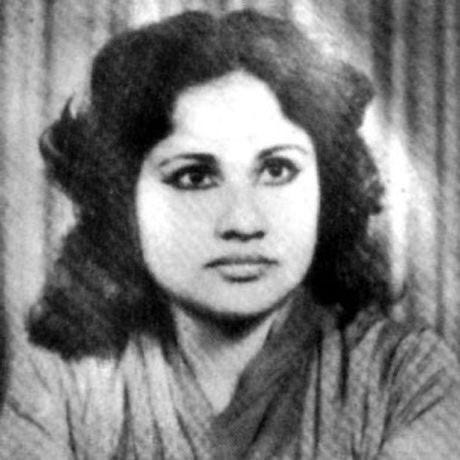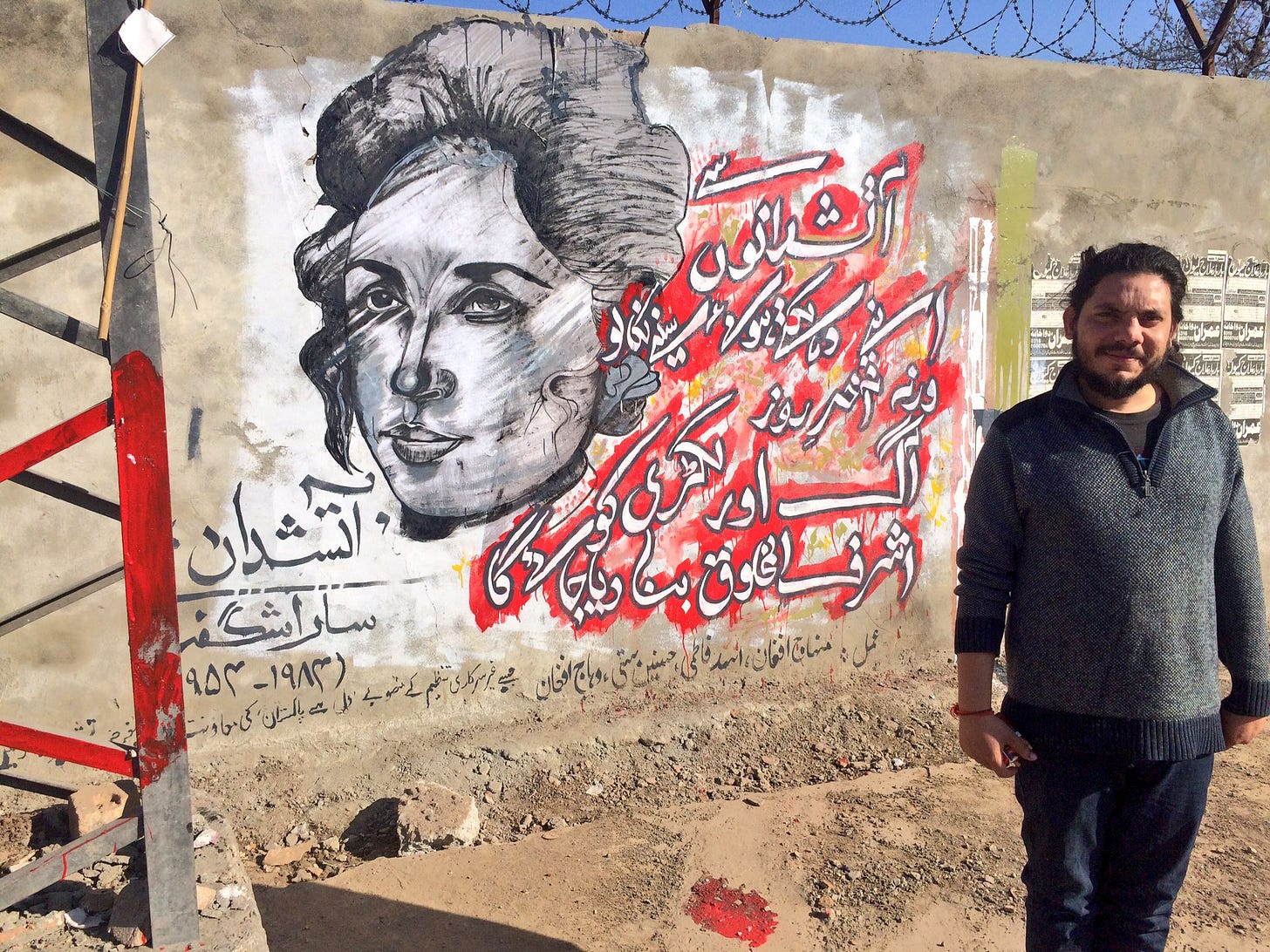Welcome to the Brown History Newsletter. If you’re enjoying this labour of love, please do consider becoming a paid subscriber. Your contribution would help pay the writers and illustrators and support this weekly publication. If you like to submit a writing piece, please send me a pitch by email at brownhistory1947@gmail.com. You can also follow us on Instagram and Twitter. You can also follow us on Instagram and Twitter.
Sara Shagufta: Not Another Sylvia Plath by Abhijeet Singh
Exile can happen anywhere. It could also occur where home is. My encounter with Sara Shagufta, the lost Pakistani poet, left me with this Saidian dilemma which becomes an acute concern of this poet while one gets to know her. There's an intricate and fine gossamer of metaphors with opaque walls of prosaic aggression, to poetic indifference and challenging madness, between one's idea of how a woman (who got married thrice, carried all this while trauma of a dead child, and spent days at mental asylum, and had friends who only added to her misery) writes and how she must be read. It is quite a point to note that it isn't very gracious to use Western signifiers to assess the stature of writers from South Asia, but Sara Shagufta has managed to remind her readers of the American poet, Sylvia Plath, the American poet who advanced the genre of Confessional Poetry by popularizing the stream-of-consciousness style in her poetry. One of the earliest mentions of this comparison and one which is popular among her admirers is by Amrita Pritam, another writer whose family migrated from India to Pakistan, just as Sara Shagufta's. In her book Ek Thi Sara, which has been translated in both Hindi and English from Punjabi, the Waris Shah devotee notes:
“I am sure of one thing: The soul of Sara was as beautiful as the white wings of the ducks. And her white wings were pulled out and what she got in return was the black wings of black abuses.”
Born on 31 October, 1954 in Gujranwala, Pakistan, Sara Shagufta got married at the age of 14. Which is likely, given her family's social status, of which little we know, but was modest and not that would've approved otherwise. Her family had migrated to Karachi from Punjab during the partition of India. As Rauf Parekh writes for Dawn, Sara belonged from "...a poor and uneducated background, she wanted to rise socially through education but could not even pass her matriculation. Her stepmother, an early marriage and subsequent three more marriages (two of her husbands were poets) all added to her mental agonies."
The tragedy is that our generation and our world and the critics and the readers are obsessed with how an artist, particularly a woman who writes poetry in this case, led her life rather than what she accumulates as self in terms of merit. The tragedy is, to recall Attiya Dawood (the renowned Sindhi poet, writer, feminist and activist, and close friend of Sara) that Sara Sagufta has become masala for those who know her. People don't acknowledge her through the account of her poems drenched in raging fire and pungent observations, but the life which has been deemed as 'controversial, scandalous and colorful' throughout the years. Attiya Dawood remarks sharply "when one talks about Jaun Elia or Ahmad Faraz, no one sits and questions their character or gets obsessed with their relationships with their partners, but is it the same case with a poet like Sara Shagufta?" It is important to note that Sara's companionship with men and her lifestyle that involved excessive drinking, smoking and fits of depression became the prime element, and wrongly so, in the reason behind her ill-reputation among the male-dominated poetic milieu of Pakistan in 70s.
Sara Shagufta has remained an 'enigmatic' character in the history of Urdu Poetry of the subcontinent, where the need to portray Sara's personality as a so-called enigma, is actually an attempt to sabotage her 'unclothed vision' evident in her poetry like a document neglected in a typical south asian sarkari daftar (government office).
In her preface to Shayari Jhankaar Nahin, Dr. Shaheena Tabassum sketches Sara's first and the only visit to India:
In 1980, when for the first and the only time she visited India, there was an apparent stir in the literary domains of Delhi. She engaged herself with several topics of debate while sitting among the men at Delhi's Coffee House, Mohansingh Place. She laughed at anything and everything. She condemned the purdah and raised her voice for women's liberation. One of her kind, she was nothing like other women poets of her time. She did not like ghazals one bit! Neither writing, nor listening. Also, she took no interest in musical or rhythmic nazms. She was first of the 'Angry Young Poets' in the tradition of Urdu Poetry.
Anger and angst becomes a recurring trope of Sara's body of work. She fondles with language as she fondles with the process that compels her to write the way she writes. The striking and yet a gentle way of putting inconspicuous shapes together and building a poem is a breeze to her. An almost effortless act of surrendering oneself to one's own creative space where nothing is threatened by the traumas imposed by the external world. Sara owns her sadness, and that is what you take away from the first reading. But after many such readings you see that she has been tormented enough by her 'prime persecutors.’ After the death of her first child, and the accusations that followed of her being responsible for the mishap, she took an oath to write poetry. Not to forget the fact that her husband was always away reading his poems in a mushaa'ira (a poetry symposium, popular in India and Pakistan), that she was always alone; when she was suffering the labour pain, when she was delivering a child, and when the child finally died.
The 'body' or the badan is central to Sara Shagufta's agency of 'uncensored' and 'rash and impulsive' articulation. As Katherine Peters says:
She wrote boldly about her personal life and sexuality, connecting what the French feminist Hélène Cixous calls the ‘female body’ with her feminine voice and bringing her sexual desires ‘into her text’.
In one of her poems Khaali Aankhon Ka Makaan she writes;
ḳhālī ā.ankhoñ kā makān mahñgā hai
mujhe miTTī kī lakīr ban jaane do
ḳhudā bahut se insān banānā bhuul gayā hai
merī sunsān ā.ankhoñ meñ aahaT rahne do
The house of empty eyes is expensive
let me become a line of dust
God has forgotten to create
a number of people
let the sound of footsteps linger
in my desolate eyes
(Transl. by Frances W. Pritchett and Asif Farrukhi)
From head to toe, the poetry in which Sara Shagufta finds her sparking rebellions and projects them on her readers in forms of shock is rather a newness of some sort. Her exclamations sound as casual as they can, and she tries not to polish them or refine them. Usually, it is a poet's life that makes them larger than life for those who understand their writings, but in Sara's case, it is otherwise and it must be that way. Sara Shagufta shoved her way with sheer passion and undiluted rage which was beyond comprehension in a patriarchal Urdu Poetry establishment of her times.
One can write as many books as one wishes to on Sara Shagufta and her way with words but importantly and firstly, the significant step for us is to come closer to her language and style and the kind of diction that she constructs in this relentless exercise to un-belong from what wrongly holds her accountable for her very existence as a woman. As we are close to end, I am thinking of what Rukhsana Ahmad wrote in the introduction of her book We Sinful Women: Contemporary Urdu Feminist Poetry while introducing Sara,
Perhaps the greatest challenge to Urdu critics and intellectuals was thrown by Sara Shagufta who violated all the conventions and norms in her poetry. Piling image upon image in a multicoloured collage of words, she reflects meaning as if through a prism of deliberate obscurity and defiance. Her poems make no concessions to the sound values of words. She shuns metrical patterns, repetition, alliteration and smooth lyrical sounds, the devices commonly favoured by traditional Urdu poets, choosing to rely instead on clusters of images.
Sara Shagufta shouldn't become another Sylvia Plath, in a sense that, her death alone should not and must not define her position as a poet. Her struggle with herself did end, and allegedly at her own hands, but that part of this tragedy has a tail laden with marriages that offered lifelong traumas, friends that maligned her reputation, and patriarchal malice that runs in our society like blood in our veins. In the end, I'd like to close this bit with an excerpt from my favourite of Sara's,
aaj tumhārī beTī apnī beTiyoñ se kahtī hai
maiñ apnī beTī kī zabān dāġhūñgī
lahū thūktī aurat dhaat nahīñ
chūḌiyoñ kī chor nahīñ
maidān merā hausla hai
añgāra merī ḳhvāhish
ham sar pe kafan bāñdh kar paidā hue haiñ
koī añgūThī pahan kar nahīñ
jise tum chorī kar loge
(from Aurat aur Namak)
Today, your daughter tells her own daughters
I shall brand my daughter's tongue
blood-spitting woman is not a metal
is not looking for bangles to steal ―
A battleground my courage, a spark my desire
We were born wearing shrouds around our heads
not rings on our fingers
which you might steal.
(Transl. by Rukhsana Ahmad from Urdu)
Zindabad Sara, Zindabad.
Credits
Abhijeet lives in Lucknow, and considers the city to be the only essential element of their evolution as a poet. He has a Master's in English Literature with a dissertation on Nemat Sadat's The Carpet Weaver. He is an atheist who loves to watch plays, eat kebabs, sing aloud, and at times, sit idle and do nothing.







I never knew Sara Shagufta's work until I read Abhijeet's article today. Thank you, thank you, thank you.
i could call this piece beautiful, but i won't. what i will say is that Sara Shagufta inspires art. aadaab, abhijeet!